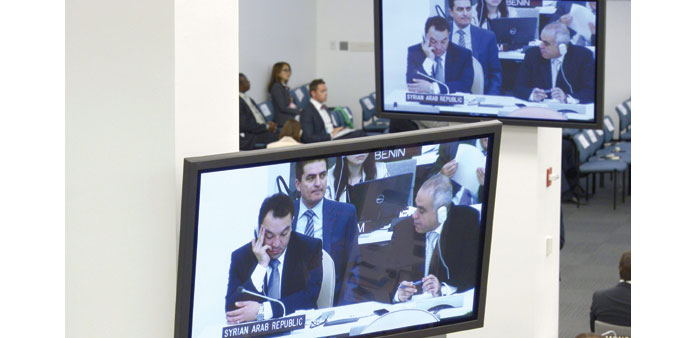Representatives from Syria are shown on a screen at the UN General Assembly yesterday.
AFP/United Nations
US President Barack Obama demanded yesterday the UN take tough action against Syria, as Russia wrangled with the West over how to strip Bashar al-Assad of his chemical arsenal.
UN Secretary General Ban Ki-moon opened the UN General Assembly leaders’ debate by calling on outside powers not to fuel the conflict, but Obama warned he remains ready to use force in Syria and the wider Middle East.
The annual summit of world powers came as Moscow signalled it may allow a US-Russian plan to collect and destroy Assad’s poison gas arsenal to be enshrined in international law.
But Russia remains strongly opposed to allowing the Security Council to bolster such a resolution by permitting member states to use sanctions or force.
In his own UN speech, Obama warned the US was ready to defend its interests in the Middle East, by ensuring oil supplies and eradicating weapons of mass destruction.
“The US of America is prepared to use all elements of our power, including military force, to secure these core interests in the region,” he told world leaders.
And he insisted that the world’s credibility was at stake after Assad’s alleged use of chemical weapons on his own people.
Russia and the US have drawn up a draft plan to put Syrian chemical weapons under international control.
“There must be a strong Security Council resolution to verify that the Assad regime is keeping its commitments, and there must be consequences if they fail to do so,” Obama said.
“If we cannot agree even on this, then it will show that the UN is incapable of enforcing the most basic of international laws.”
Obama criticised those who question whether Assad carried out the August 21 sarin attack near Damascus, which US intelligence says killed 1,400 people.
“It is an insult to human reason—and to the legitimacy of this institution—to suggest that anyone other than the regime carried out this attack,” Obama said.
The US leader was elected in part thanks to his track record as a critic of the Iraq war and has been reluctant to intervene in Syria, but was prodded to act by the August 21 attack.
He threatened to launch a punitive strike on Assad’s regime—at one point last month US officials briefed reporters that the region was just days from a cruise missile strike.
But Russia stepped in with a plan for Assad to voluntarily surrender its arsenal, and Obama suspended the threat of strikes while the world waits to see if it will work.
In order to give the plan teeth, Western and Arab powers want a UN Security Council resolution to enshrine it in law.
Russia, however, is at loggerheads with US, French and British envoys over the wording of the draft—refusing to allow anything that would permit a recourse to force or sanctions.
Yesterday, Deputy Foreign Minister Sergei Ryabkov stressed that Chapter VII of the UN Charter could be invoked only if the accord is violated by either side in the Syrian conflict.
Chapter VII of the UN charter has dozens of articles, and Western negotiators are not yet seeking to invoke Article 42, which permits military action.
Russia opposes any suggestion of sanctions under Chapter VII.
“There can be no discussing the adoption of a resolution under Chapter VII about the automatic implementation of sanctions or, all the more, the use of force,” Ryabkov told the State Duma lower house of parliament.
He emphasised that the resolution should be aimed at bolstering the Organisation for the Prohibition of Chemical Weapons (OPCW), which oversees the treaty banning such arms.
Ryabkov dubbed the threat of military action “illogical” and complained that “contacts with the Americans are, unfortunately, not going as smoothly as we would like.”
In his speech, Obama said the US would provide another $340mn in humanitarian aid for the Syrian crisis, which has produced some 2mn refugees.
The State Department said the aid brings the US contribution to nearly $1.4bn and includes support for food, clean water and shelter.
But the US and its Arab allies are also providing equipment for the Syrian rebels—just as Moscow remains Damascus’ main armourer.
Without singling countries out, Ban declared: “I appeal to all states to stop fuelling the bloodshed and to end the arms flows to all parties.”
The UN chief urged Assad, his opponents and “all those in this hall with influence over them” to press for a peace conference to end a war that has left more than 100,000 dead.

